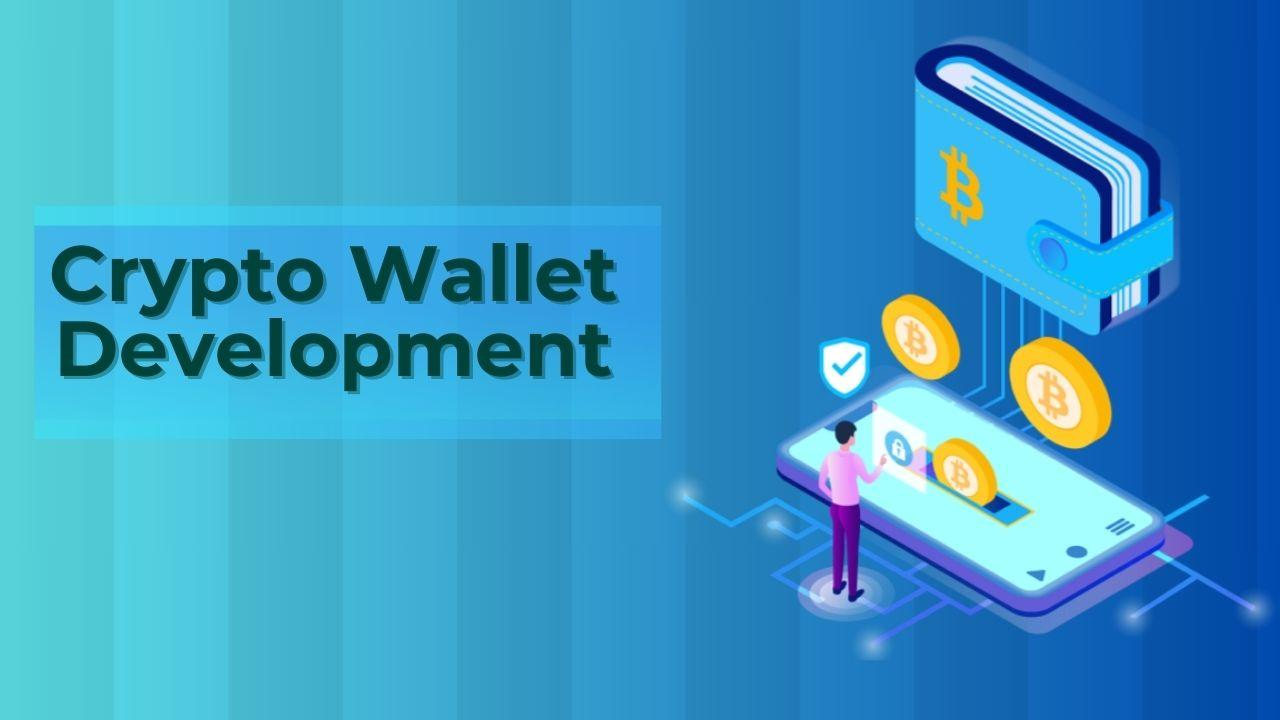A Comprehensive Guide to Crypto Wallet Development

Cryptocurrencies have transformed the global financial landscape, enabling secure and decentralized transactions. As the demand for digital currencies grows, so does the need for reliable and secure crypto wallets. A crypto wallet serves as a bridge between users and the blockchain, allowing them to store, send, and receive cryptocurrencies safely. This guide delves into the fundamentals of crypto wallets, their types, features, and the benefits they offer to businesses and users alike.
What is a Crypto Wallet?
A crypto wallet is a digital tool that allows users to securely store, send, and receive cryptocurrencies. Unlike traditional wallets that store physical cash, crypto wallets store private and public keys, which are essential for accessing and managing blockchain-based assets. Whether it’s Bitcoin, Ethereum, or any other cryptocurrency, a wallet ensures secure interactions with the blockchain.
Importance of Crypto Wallets in the Blockchain Ecosystem
Crypto wallets are the backbone of blockchain technology, enabling seamless transactions while maintaining decentralization. They provide users with full ownership and control of their assets without needing third-party intermediaries. Wallets also enhance security, as they use encryption and advanced protocols to safeguard funds. Moreover, crypto wallets play a vital role in supporting DeFi (Decentralized Finance) applications, making them indispensable in today’s blockchain ecosystem. Many traders rely on wallets to facilitate SOL to USD conversions efficiently and securely.
Types of Crypto Wallets
1. Hot Wallets
Hot wallets are connected to the internet, offering real-time access to cryptocurrencies. While convenient for frequent transactions, they are more vulnerable to hacking.
a. Web Wallets
Web wallets run on browsers and are accessible from any device with internet connectivity. Examples include wallet extensions like MetaMask or hosted wallets on exchanges.
b. Mobile Wallets
Mobile wallets are smartphone applications that allow users to manage their crypto on the go. They’re ideal for quick transactions and often include QR code functionality for ease of use.
c. Desktop Wallets
Desktop wallets are installed on PCs or laptops, offering a balance between convenience and security. They are popular among traders who need regular access to their crypto.
2. Cold Wallets
Cold wallets store cryptocurrencies offline, offering maximum security against hacking attempts.
a. Hardware Wallets
Hardware wallets are physical devices that store private keys offline. They are highly secure and recommended for long-term storage of large crypto holdings.
b. Paper Wallets
A paper wallet involves printing private and public keys on paper, eliminating online exposure. However, they require careful handling to prevent physical damage or loss.
3. Custodial vs. Non-Custodial Wallets
- Custodial Wallets: These wallets are managed by a third party, such as exchanges, which store users’ private keys on their behalf.
- Non-Custodial Wallets: These wallets give users complete control over their private keys and funds, ensuring higher security and independence.
Key Features of a Crypto Wallet
1. Multi-Currency Support
A good crypto wallet supports multiple cryptocurrencies, allowing users to manage diverse assets in one place.
2. High-Level Security Protocols
Features like two-factor authentication (2FA), biometric authentication, and encryption safeguard user assets from unauthorized access.
3. User-Friendly Interface
An intuitive design ensures a seamless user experience, even for beginners in the cryptocurrency space.
4. QR Code Scanner for Transactions
A built-in QR code scanner simplifies sending and receiving crypto, reducing errors in manually entering wallet addresses.
5. Backup and Recovery Options
Backup and recovery mechanisms, such as seed phrases, ensure that users can recover their funds in case of device loss or failure.
Benefits of Developing a Crypto Wallet
1. Secure Storage for Cryptocurrencies
A custom crypto wallet provides advanced security features, ensuring safe storage of digital assets and reducing the risk of theft.
2. Faster and Cost-Effective Transactions
Crypto wallets enable instantaneous transfers across the globe with minimal transaction fees, compared to traditional banking systems.
3. Complete Ownership and Control
Non-custodial wallets give users full control over their funds, eliminating reliance on third-party services and ensuring privacy.
4. Supports the Growth of DeFi
Crypto wallets play a crucial role in the DeFi ecosystem by enabling users to interact with decentralized apps (DApps) for lending, borrowing, and staking.
6 Steps to Develop a Crypto Wallet
1. Define Your Wallet Type and Features
Decide on the type of wallet you want to create: hot or cold, custodial or non-custodial. Determine essential features such as multi-currency support, QR code scanning, transaction history, and backup options.
2. Choose the Blockchain Platform
Select a blockchain platform that aligns with your wallet’s goals. Popular choices include Ethereum, Bitcoin, or Binance Smart Chain, depending on the supported cryptocurrencies and use cases.
3. Integrate Crypto Wallet APIs
Use APIs like Coinbase, Tatum, or Blockchain.info to enable blockchain connectivity, real-time transaction updates, and wallet address management for a seamless experience.
4. Develop a User-Friendly Interface
Create an intuitive and clean interface to ensure users can easily navigate your wallet, even if they are new to cryptocurrencies. Prioritize a responsive design for web and mobile platforms.
5. Implement Robust Security Features
Incorporate features like encryption, biometric authentication, and two-factor authentication (2FA). Secure private keys with hardware security modules (HSM) to prevent breaches.
6. Test and Deploy the Wallet
Conduct thorough testing to identify and fix bugs. Perform security audits and ensure compliance with regulations before deploying your wallet to app stores or web platforms.
Unlock the potential of blockchain with the right partner—start your crypto wallet development journey with Moon Technolabs today!
Technologies Used in Crypto Wallet Development
1. Blockchain Technology
The core of any crypto wallet, blockchain ensures decentralized and immutable transactions. It powers features like transaction tracking and asset management.
2. Cryptographic Algorithms
Algorithms like SHA-256 and elliptic curve cryptography (ECC) secure wallet transactions and safeguard private keys from unauthorized access.
3. APIs for Blockchain Connectivity
APIs simplify interactions with the blockchain, providing features like transaction execution, balance checks, and wallet address generation.
4. Programming Languages (JavaScript, Python, etc.)
Languages like JavaScript, Python, and Solidity are commonly used to develop wallets and integrate smart contract functionalities.
Challenges in Crypto Wallet Development
1. Ensuring Security Against Cyber Threats
Cyberattacks, such as phishing and malware, pose significant risks. Developers must implement advanced security measures to protect user funds.
2. Managing Transaction Speed
High transaction volumes can slow down blockchain networks. Optimizing wallet performance to handle delays is a critical challenge.
3. Integration of Multi-Currency Support
Ensuring compatibility with various cryptocurrencies requires significant development effort and continuous updates to support new coins and tokens.
4. Meeting Regulatory Compliance
Navigating the complex legal landscape of cryptocurrencies, such as KYC (Know Your Customer) and AML (Anti-Money Laundering) regulations, is a challenge for wallet developers.
Future Trends in Crypto Wallet Development
1. Integration with DeFi Platforms
Crypto wallets are evolving to enable seamless interaction with decentralized finance (DeFi) platforms, allowing users to lend, borrow, and stake cryptocurrencies directly.
2. Support for NFTs (Non-Fungible Tokens)
With the rise of NFTs, wallets are being enhanced to store and display digital collectibles alongside traditional cryptocurrencies.
3. Advanced Security with Biometric Authentication
Biometric security features, such as fingerprint and facial recognition, are being integrated to provide enhanced protection and convenience.
4. Introduction of AI-powered wallets
Artificial intelligence is being leveraged to optimize wallet performance, analyze transaction patterns, and offer personalized investment insights.
Conclusion
Crypto wallets are integral to the blockchain ecosystem, offering users a secure and efficient way to manage digital assets. By incorporating advanced features, robust security measures, and seamless integration with modern technologies, developers can create wallets that cater to a wide range of users and business needs. However, building a reliable crypto wallet requires technical expertise and a deep understanding of blockchain technology.
If you’re looking to develop a feature-rich and secure crypto wallet, partnering with an experienced company like Moon Technolabs can make all the difference. With their expertise in blockchain development and innovative solutions, Moon Technolabs can help you design a wallet that meets your unique requirements while ensuring top-notch performance and security.
FAQs
- What is the difference between hot and cold wallets?
Hot wallets are internet-connected and suitable for frequent transactions, while cold wallets are offline and provide enhanced security for long-term storage. - How secure are crypto wallets?
Crypto wallets are secure when they use features like encryption, two-factor authentication, and private key protection. However, users must also take precautions to avoid scams. - What features should a good crypto wallet have?
Essential features include multi-currency support, QR code transactions, robust security, backup options, and an easy-to-use interface. - How much does it cost to develop a crypto wallet?
The cost varies depending on complexity, features, and technology used, ranging from $20,000 to $150,000 or more for advanced wallets. - What is the future of crypto wallets?
The future lies in DeFi integration, NFT support, enhanced security, and AI-powered solutions, making wallets smarter and more versatile.






